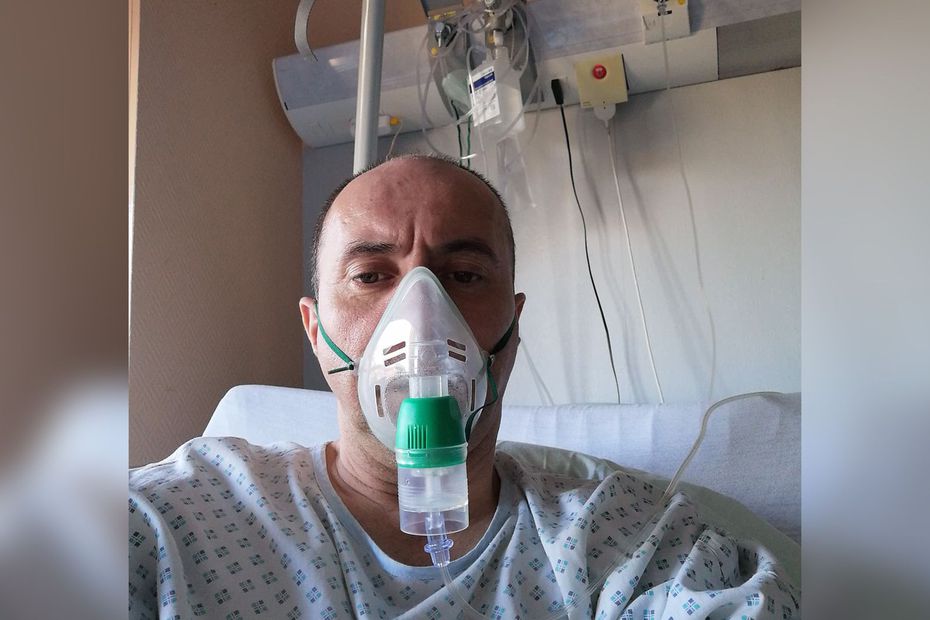A patient at the Amiens University Hospital who presented symptoms of the Covid-19 coronavirus was administered hydroxychloroquine-based treatment. 48 hours after starting treatment, his condition appears to have improved. But oddly, according to the hospital, the Covid-19 test, carried out twice, was negative.
” I still can’t believe it, ” wrote Xavier Fouque from his hospital room. “On Saturday, I was a vegetable, I couldn’t even open my eyes because the light hurt my head. ” This story with multiple twists and turns has not finished talking.
The first symptoms of the Covid-19 coronavirus appeared on March 12. The 48-year-old man, from Laviéville in the Somme, then went to his attending physician, who diagnosed him with bronchitis and prescribed him antibiotic treatment.
“I felt myself dying”
A few days later, on Wednesday March 17th, Xavier’s state of health worsened and his doctor advised him to call 15. An ambulance took him to the Amiens University Hospital. Xavier was not feverish, but they suffered from heavy coughing fits, ” burning throat and lungs ” and severe headaches. A first test for Covid-19 is carried out on his arrival at the hospital, but he claims that the results are not communicated to him.
On Friday, March 20, his condition worsened. ” I had a big cough attack, I could no longer breathe, he says. The nursing staff did not think about it, they rushed into my room with their masks and gloves. ” VS’ is when Xavier is at its lowest. “I felt like I was dying. (…) I have four children, I haven’t stopped thinking about them. I was so afraid to abandon them. “ Without hesitation, he adds that the caregivers ” saved his life. “
A CT scan then reveals an infection in the lungs. A new test for Covid-19 is carried out, but Xavier assures that “He is still not informed of the results. Everything leads him to believe that it is indeed the coronavirus. He even reports the presence of labels indicating” new coronavirus Covid-19 “in his bathroom.
Negative tests
The University Hospital of Amiens confirms having administered hydroxychloroquine but ensures that the two tests carried out four days apart came back negative. Recontacted, Xavier told us again that he had not been informed of the results of the tests. He would not have been informed until after the article was published on our website. “ I was just told, at 6:20 pm (two hours after publication of the article, editor’s note), that the two tests were negative. ” It was also at this time that he was told another surprising piece of news: “ Since I’m negative, they stop the hydroxychloroquine. ” More tests should be done to determine what he really has.
Significant improvement in 48 hours
Nevertheless, the day after the start of treatment, Xavier feels the effects. “ I still felt weak, but I already felt better. ” Today, 48 hours later, he is still a little weak and still has trouble speaking, but he feels a marked improvement. ” Before, I had inhalations of oxygen regularly, between 8 and 12 per day. Today, only when needed, when breathing becomes too difficult , he says. The doctors keep me under surveillance, and if my condition continues to progress, I could finish the treatment at home, with strict rules of confinement, it is above all necessary that I avoid being contaminated again.“Doctors are also watching for side effects, which are known to these drugs, but Xavier hasn’t had any so far.” Worried? No, I trust them. “
He tells us many times how grateful he is to the nursing staff.” I thank the caregivers every time they enter my room. They are not soldiers, but it looks like it. (…) When I was at my worst, my wife called the service, they always informed her but also reassured her. “
Experimental treatment
If it has been defended since the start of the epidemic by Professor Didier Raoult, an infectious disease specialist in Marseille, it is still early to know the results on a large scale. The Marseille doctor announced that he had treated several of his patients in this way and had obtained promising results.
Related:
France Soir – Opinion: CovidPapers, Recovery, & the Oxford Connection

